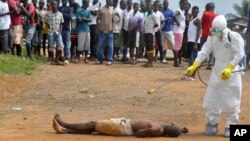In the crowded slum of West Point, volunteer health workers went door-to-door through the cramped, musty alleyways looking for sick people. The volunteers were looking for sick people, including possible ebola cases.
“We are here on health matters,” said one volunteer approaching a resident during a recent visit. “We want to know as to whether you have any sick persons. Somebody suffering from malaria, fever, typhoid, pressure?”
People shook their heads.
“Anyone have a cold?” the worker said. “Are any children sick?”
“We got no sick persons here," one resident replied.
Liberia is the West African nation worst hit by the outbreak of the deadly Ebola virus, with new data from the World Health Organization showing the overall death toll in the region jumping to 2,000.
A total of 4,000 cases have been reported, the agency said, with Liberia seeing more than 200 new cases per week. Sierra Leone is seeing more than 150 and Guinea more than 100.
Liberia’s government has struggled to fight the spread of the disease. In the capital Monrovia, the West Point slum was under quarantine for two weeks as the government struggled to contain the disease.
That drastic measure prompted violent clashes between residents and security forces Aug. 20 that killed one person, a teenager living in West Point. The government lifted the quarantine on Saturday, and began sending in volunteers to try and outflank the virus.
Deputy Health Minister Tolbert Nyensuah insisted the government was making progress, though said the battle is slow going.
“The fact is that transmission is still going on. I’m not saying that transmission has been broken," he said. "I cannot deceive the world."
Complicating the battle is that it is now the height of the malaria and typhoid season in Liberia, illnesses with symptoms similar to Ebola's.
Door-To-Door in West Point
The volunteer team canvassed the neighborhood. They got a tip that there may be a sick person near the mosque, and went in that direction.
“Nobody die here in recent times," one resident said. "We let you people know. We don’t have no patient here."
But another woman came up and said yes, her neighbor has a sick girl.
They went to house. The girl was brought out rubbing her eyes. She had a fever and had been vomiting.
The volunteers added the girl to their list and said a response team would follow up. No one seemed to know when.
At West Point's health center, meanwhile, the waiting room was nearly empty: residents fear coming for a check-up or treatment that might end up getting them contaminated or taken to isolation.
Those fears were compounded by anger when the government set up a holding center for Ebola patients in West Point, apparently without notifying residents. That prompted a mob to attack the holding center on Aug. 17, followed by the quarantine three days later.
Government spokesman Lewis Brown said the quarantine was merited, given many people’s denial of the problem .
“There was a level of denial that needed, in our mind, shock therapy, that needed to be awakened to the fact that look, this is deadly,” Brown said. “This is serious. This is no hanky-panky business.”
Contact tracers - the people charged with identifying and diagnosing those who may have come in contact with an infected person - are now out every day in West Point checking up on 150 people in relation to the areas of 30 suspected ebola cases.
Their supervisor, Marie Hiding, says the follow-up is chipping away at community resistance.
“When you see someone going to your house every day [asking] ‘how are you coming on? Are you sick today? No?’ They will be happy to see us because they see that we care for them and we are concerned," she said.
Global Ebola Center
Elsewhere Friday, U.N. Secretary General Ban Ki-moon said that the world body would set up a crisis center to coordinate efforts to combat the disease. And the European Union promised $181 million in assistance to help strengthen health systems, train health workers and pay for mobile testing laboratories in the four countries.
There is currently no approved treatment for the deadly disease, although an experimental serum, Zmapp, made by a U.S. company, has been given to a small number of patients, some of whom have survived.
Meanwhile, a third U.S. health care worker was set to return home after contracting the virus while working in West Africa.
In an op-ed piece published in The Washington Post, World Bank President Jim Yong Kim and Dr. Paul Farmer, founder of a well-regarded charity Partners in Health, described the global response to Ebola as “disastrously inadequate.”
The two blamed the response on what they said was the lack of adequate basic health care in West Africa and a bias toward wealthier nations.
Material from Reuters was used in this report.




